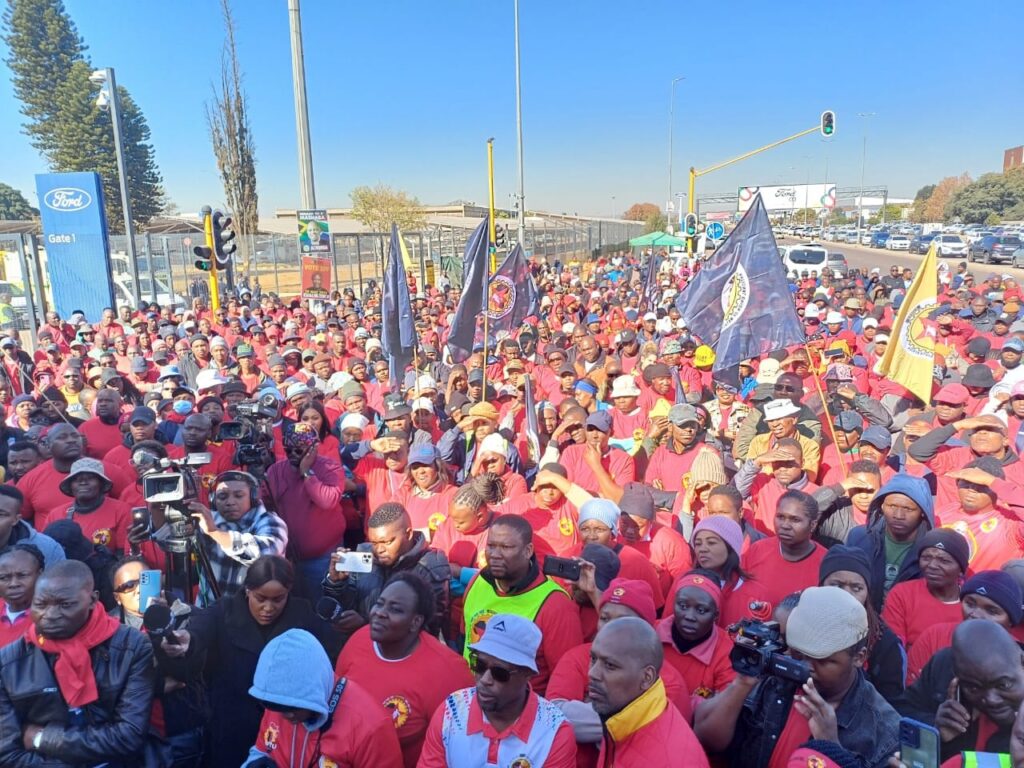Read this article in:
English
- Español
21 November, 2025On 14 November, the National Union of Metalworkers of South Africa (NUMSA), affiliated to IndustriALL Global Union and the country’s largest manufacturing union, concluded a three-year wage settlement with the Automobile Manufacturers Employers’ Organisation (AMEO), averting a strike that had loomed after months of deadlock.
The agreement, running until 2028, provides a 7 per cent increase effective from July 2025, followed by the higher of 5.5 per cent or Consumer Price Index (CPI) in each of the subsequent two years. Workers will also receive a tax-free gratuity of R12,500 (US$720), unchanged medical-aid contributions and an increased transport allowance.
NUMSA members from the seven original equipment manufacturers (OEMs) operating in South Africa — BMW, Ford, Isuzu, Mercedes-Benz, Nissan, Toyota and Volkswagen — endorsed the deal.
“NUMSA welcomes the signing of this agreement, particularly because the union had deadlocked with employers and we were on the verge of a strike. Thankfully, we were able to conclude this round of wage talks and the union is grateful for the efforts made by the negotiations team who worked tirelessly to secure this deal,”
said Irvin Jim, NUMSA general secretary.
While welcoming the settlement, NUMSA wants engagement on industrial policy. For instance, imported vehicles now account for 63 per cent of new-car sales, up sharply in recent years, with much of the surge coming from low-cost producers in China and India — fellow BRICS (Brazil, Russia, India, China and South Africa) members whose exports benefit from subsidised input costs and scale advantages. NUMSA argues that South Africa cannot compete on price alone and is pressing the government for a comprehensive industrial-policy response.
The union’s demands are threefold: stricter local-content requirements and trade remedies to curb dumping by BRICS partners, policy requirements for Chinese and Indian brands to establish local assembly and component-manufacturing plants, and a broader re-industrialization package encompassing steel, energy and downstream beneficiation. The industry’s own masterplan to 2035 already targets 60 per cent local value addition and NUMSA insists that the government must now enforce it.
NUMSA is calling for an urgent tripartite summit involving government, labour and the OEMs to craft binding measures before further plant closures or shift reductions occur. Continued inaction risks massive job losses in an industry that still employs over 110,000 workers directly and sustains a far larger ecosystem of component suppliers.
“We applaud NUMSA for continuing to fight for living wages and better conditions in the auto industry and for successfully negotiating this wage deal. Manufacturing and beneficiation along value chains are key as they anchor South Africa’s industrialization initiatives,”
said Paule-France Ndessomin, IndustriALL regional secretary for Sub-Saharan Africa.
